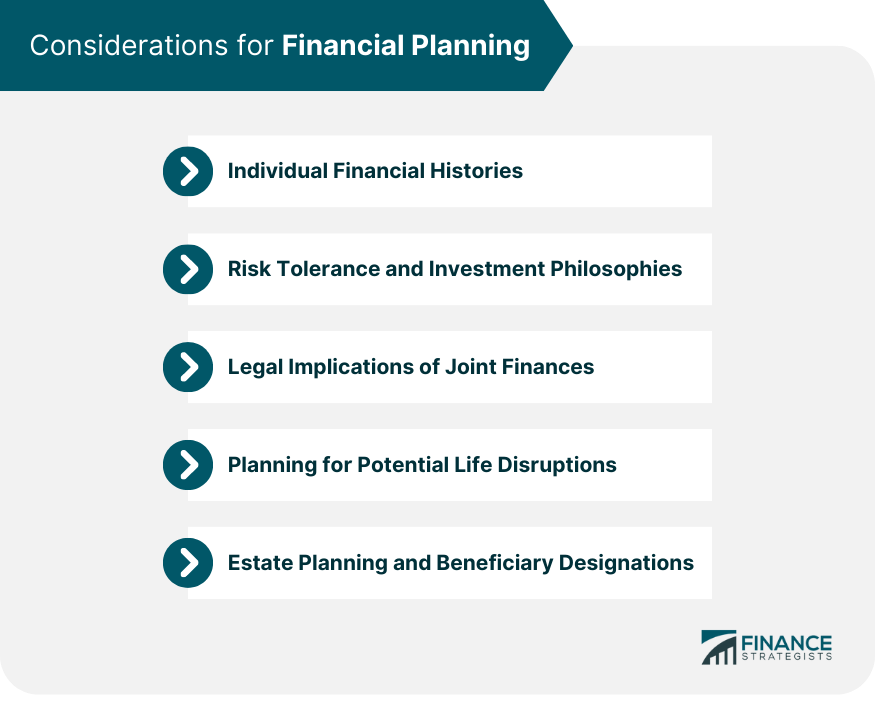Financial planning, at its core, refers to the systematic and strategic approach taken to manage one's finances in order to achieve specific short-term and long-term financial objectives. It encompasses a wide range of activities, including budgeting, saving, investing, and preparing for future financial needs and uncertainties. For married couples, financial planning takes on an even greater significance. Marriage signifies not only a union of two lives but also a merging of financial destinies. Proper financial planning allows couples to align their financial aspirations, ensure they're working collaboratively towards shared goals, and navigate the complexities of joint financial responsibilities. Without a clear financial roadmap, couples might find themselves facing unnecessary stress and disagreements related to money. But with a well-laid plan, they can build a strong financial foundation that supports their life's journey together, whether that includes buying a home, raising children, traveling the world, or retiring comfortably.
Undertaking the following steps will provide married couples with a holistic financial blueprint, allowing them to navigate their financial journey confidently, securely, and harmoniously. Financial harmony begins with understanding. Married couples should share their financial histories, experiences, and beliefs about money. It's vital to understand each other's perspectives on spending, saving, and investing. Discussing past mistakes and successes can provide insights into individual money mindsets. Moreover, being proactive about potential financial disagreements and setting up methods to address them productively is essential. Setting short-term objectives like vacations or car purchases, medium-term aspirations like purchasing a home or starting a family, and long-term aims such as retirement or philanthropy provides direction. Collaborative goal setting ensures that both partners work towards a shared future, fostering unity and mutual understanding. Budgeting acts as the roadmap for financial journeys. By detailing all sources of income and categorizing expenses, couples gain clarity on their financial health. Regular monitoring can highlight potential areas of savings or overspending. A crucial aspect of budgeting is also setting aside a fixed percentage of the income for savings and investments, ensuring future financial security. An emergency fund acts as a safety cushion for unforeseen financial shocks. Depending on individual risk tolerance and job security, couples should aim to save between three to six months' worth of expenses. Keeping these funds in a high-yield savings account ensures they are both growing and readily accessible. Debts can be a significant impediment to financial freedom. By ranking debts based on interest rates and outstanding amounts, couples can develop an effective repayment strategy. Techniques such as the snowball or avalanche methods can be instrumental. Equally vital is cultivating habits to avoid accumulating unnecessary future debts. Insurance is the protective shield against unforeseen adversities. Regular reviews of existing policies can highlight potential coverage gaps. As life changes – maybe with the addition of children or the purchase of a new home – insurance needs to evolve. Periodic updates ensure continued protection against potential financial risks. Investing is the key to growing wealth. Diversifying investments across various assets, aligning them with specific financial objectives, and continuously educating oneself about market trends are essential steps. An informed and well-considered investment strategy can significantly enhance financial growth. Retirement planning is about ensuring comfort in the golden years. Using tools like retirement calculators, couples can forecast the funds they'll require. Additionally, benefits like employer-matched 401(k) contributions should be maximized to enhance retirement savings. Preparing for the future involves more than just savings and investments. Estate planning ensures that assets are distributed according to one's wishes after passing. Proper documentation and deciding on issues like guardianship for children are critical elements of this step. While self-education is crucial, seeking expert guidance can offer various insights. Certified Financial Planners and tax specialists can offer advice tailored to individual circumstances, ensuring optimal financial decision-making. By integrating their expertise into the financial planning process, couples can navigate complex financial terrains with greater confidence and precision. Navigating the financial landscape as a married couple offers unique challenges and opportunities, making planning an essential tool for sustained success. Here are five benefits of financial planning for married couples: • Enhanced Financial Security: This security not only provides peace of mind but also ensures that they are better prepared for future expenditures, whether planned or unexpected. • Aligned Financial Objectives: Financial planning allows couples to discuss and set shared goals. Having aligned objectives ensures both partners work collaboratively towards their shared future, minimizing potential conflicts. • Efficient Wealth Growth: With a well-thought-out financial plan, couples can identify the best investment strategies tailored to their risk tolerance and financial goals. Over time, this proactive approach to investing can lead to substantial wealth growth, ensuring a comfortable lifestyle and a promising financial future. • Preparedness for Life's Milestones: Financial planning prepares couples for significant milestones, ensuring they have the necessary resources when needed without compromising their financial stability. • Optimal Use of Resources: Whether it's maximizing tax deductions, leveraging employer-matched retirement contributions, or taking advantage of investment opportunities, a well-laid-out plan ensures resources are used optimally. When embarking on the journey of joint financial planning, married couples are presented with a myriad of intricate factors that demand attention and understanding. Before diving into joint financial planning, couples should consider and understand each other's individual financial histories. Past debts, credit scores, and financial habits can impact future joint financial decisions and should be addressed upfront to prevent surprises or misunderstandings. Every individual has a different risk tolerance when it comes to investing. Couples need to consider and align on whether they are conservative, moderate, or aggressive in their investment approach. This alignment is crucial for making unified investment decisions that both partners are comfortable with. Depending on the jurisdiction or region, there can be legal implications tied to joint bank accounts, property ownership, and other financial assets. Couples should consider understanding these implications, potentially consulting with legal or financial professionals to ensure they're making informed decisions. When setting a financial plan, couples should consider potential disruptions, such as job losses, health issues, or other unexpected challenges. Having strategies or backup plans in place for such scenarios is a wise consideration. Beyond the immediate future, couples should consider long-term plans, including estate planning. This involves decisions about distributing assets upon one's passing and might include topics like wills, trusts, and beneficiary designations. It's essential to ensure that these designations reflect the couple's wishes and are updated as life circumstances change. Financial planning for married couples is a crucial endeavor that goes beyond just managing money. It's a journey of aligning aspirations, setting goals, and nurturing unity through effective communication and collaboration. By opening lines of communication, shared goals, joint budgets, emergency funds, addressing debts, planning for insurance, making informed investments, retirement, and estate planning, couples can pave the way for a secure and harmonious financial future. Enhanced financial security, aligned objectives, efficient wealth growth, preparedness for milestones, and optimal resource utilization all contribute to a fulfilling life journey together. However, successful financial planning also requires considering individual financial histories, risk tolerances, legal implications, potential disruptions, and long-term estate planning. Ultimately, a well-structured financial plan empowers married couples to navigate the complexities of joint finances with confidence and clarity.Financial Planning for Married Couples
Steps on Financial Planning for Married Couples
Open the Lines of Communication
Set Shared Financial Goals
Create a Joint Budget
Build an Emergency Fund
Address Debts
Plan for Insurance
Invest Wisely
Think About Retirement
Estate Planning
Seek Professional Advice

Benefits of Financial Planning for Married Couples

Considerations for Financial Planning
Individual Financial Histories
Risk Tolerance and Investment Philosophies
Legal Implications of Joint Finances
Planning for Potential Life Disruptions
Estate Planning and Beneficiary Designations

Conclusion
Financial Planning for Married Couples FAQs
Financial planning for married couples refers to the strategic process of managing shared finances to achieve common short-term and long-term goals while minimizing conflicts and ensuring financial stability.
Financial planning is crucial for married couples as it helps them align their financial goals, navigate joint responsibilities, and prevent disagreements related to money. It ensures efficient resource allocation, enhances financial security, and supports a harmonious partnership.
Married couples should begin by opening clear lines of communication. They should then collaboratively set shared financial objectives, create a joint budget, build an emergency fund, address debts, and consider insurance and investments to lay a strong financial foundation.
Financial planning offers several benefits, including enhanced financial security, aligned objectives that reduce conflicts, efficient wealth growth through informed investments, preparedness for life's milestones, and optimal use of resources.
Married couples should consider individual financial histories, align risk tolerances and investment philosophies, understand the legal implications of joint finances, plan for potential disruptions like job losses, and think about long-term estate planning.
True Tamplin is a published author, public speaker, CEO of UpDigital, and founder of Finance Strategists.
True is a Certified Educator in Personal Finance (CEPF®), author of The Handy Financial Ratios Guide, a member of the Society for Advancing Business Editing and Writing, contributes to his financial education site, Finance Strategists, and has spoken to various financial communities such as the CFA Institute, as well as university students like his Alma mater, Biola University, where he received a bachelor of science in business and data analytics.
To learn more about True, visit his personal website or view his author profiles on Amazon, Nasdaq and Forbes.











